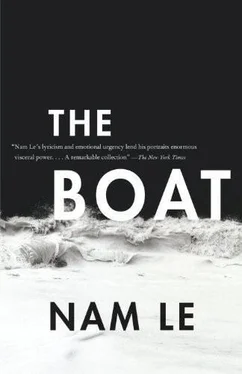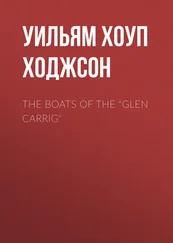"So?" said Cale.
"You don't know shit." Cale nodded in satisfaction. "Ahh," he said. "If only you truly believed that."
Jamie laid one eye up against a crack between two timbers, felt the old, beaten wood on his face. If he could choose a place — if it could be all his — this was it. Strange how trying to think and trying to forget amounted to the same thing here. Cale was still talking about Alison. The sound of his voice familiar, pointless, in keeping with the complaint of the mooring lines, the metal creakings from the wharf's gantry crane across the bay. He was talking about Alison and Jamie wasn't listening but then something dislodged itself from the craw of his memory and the incident was undammed, clear and natural as breathing: Last summer — sun-white day — Jamie crabbing on the flats when word was sprinted down from town: Fight . The thrill in his blood as he raced up the main street. Kids streaking in from every direction, breathlessly swapping accounts on the way: Dory — him and some bloke — Vance Wilhelm, that was his name — who'd been spending time with Alison. Sirens started up to the south just as Jamie veered into the main carpark. Through the mayhem he took in the whole scene at once: a black jeep, its windshield smashed, keeled back at an odd uphill slope; people limping off, nursing arms; the flash of a blood-slagged face. He was about to scatter as well when he saw, on a grassy strip, two bodies asprawl one another — elbows bloody, pebbled with glass — one finally shunting its knee into the other's back, wrenching the head up into an armlock. The face looked full at Jamie. It was to Lester — Dory's best friend. Jamie , it gasped, get him off me .
"Hey, Romeo," Cale called out.
Always he returned to this. Get him off me. And — weak in the legs — he'd frozen. A heavy shape barreled across his vision and lifted the body clean off Lester and drove it hard into the ground. Trapped beneath Dory's weight, it gave out an odd creaking sound. Jamie circled around for a last look, saw Dory holding down the head, then saw the stranger's face — it could only have been Wilhelm — his mouth agape and crammed over a steel sprinkler head, cheeks streaming and shuddering. His face a picture of drowning. Lester staggered to his feet and glared at Jamie, then Dory looked up at him too. Lester made to speak but Dory stopped him. His arms still bearing down on Wilhelm's head, he'd said: You're rubbish .
But that was a year ago. Now, things were different. He was a hero now.
"Hey, Jamie, wake up." Cale's voice sounded as though it had risen a meter.
"Hmm."
"Your girlfriend's here."
"Piss off."
Bit by bit his thoughts tailed off; he began to feel the knurled wood jutting into his hip bone. His back roasting. He gazed down. Small schools of baitfish inflected the clear water. Old squidding lines and sinkers caught on the crossplanks, bearded with kelp.
"Nothing you wanna say to her?"
Jamie reached behind himself and pulled down his board-shorts, flapping one bum cheek open and shut: "Piss… off."
Michael sniggered.
"Piss… off… Cale… y."
"Any luck?"
A girl's voice — he spun over, shielded his eyes. It couldn't be. She was standing at the head of the jetty with Tammie, both decked out in their netball gear. Alison still wearing a bib that spelled "GA" — goal attack — in large lettering. Cale, next to him, cracking up.
"Nope," reported Michael. "No fish."
"What'd I say?" said Cale.
"You're a fuckwit," said Jamie.
"I'm a fuckwit? Whose knickers are down?"
Even Michael couldn't conceal his smile. Tammie laughed, a squeezed sound like the yapping of a small dog. She was playing with her camisole straps, studying him.
"You told me to come," said Alison.
He got up, face burning. He felt suddenly naked in front of them. Even though everyone, all summer, went around in just their boardies, he felt naked. "We're actually heading back," he said, gesturing to Michael. Why had he said that?
"Cool," said Alison. "C’arn, then." She turned to address Cale: "There's a party on Thursday. Slogger Tom's place-you should come too." "What's in it for me?" For a second Jamie was thrilled by his friend's boldness, then he felt strangely uneasy.
"You're Cale, right?" "Yep," he said, grinning broadly.
But Alison didn't fall for his act. Her voice turned clerical, polished: "This is Tammie." Tammie smiled dutifully. She was hot alright, thought Jamie, but when she smiled there was something puddled about her face.
Cale said, "So this is Tammie."
The whole way, Michael walked in front of them, lugging the gear in one hand and his cricket ball in the other. He kept his head bowed and never looked back. By some instinct he led them on a roundabout route — avoiding the foreshore, the main street with its drab, dusty stretch of shops — and cut across the edge of the tidal flats. The afternoon was cooling fast.
Still plenty of people around.
When they reached the asphalt Alison touched her hand to the back of Jamie's elbow. She crossed the road and started hiking up the scrubby slope. Jamie watched his brother trudge the other way, up the road to their house. Then, without a word, he followed Alison. The ground beneath them skiddy with shell grit. As they climbed, the sun absorbed itself into her body: calves, hamstrings, the belt of skin above her skirt, the backs of her golden arms. The glaring nylon letters on her bib. She scuffed through the saltbush and mulga, kicking up little plumes of dust, and he stepped hypnotically into them.
They reached the clearing. At the center of the bluff — on its highest table of land — was the old stone courthouse, long ago ruined. It was arched with white, oxidized columns, reared against a low sky. The seaward wall had been torn away by the weather, creating the impression of a great stage overlooking the ocean.
Alison led him around the jagged masonry and leaned against a wall, bouncing on her heels.
"What's the saddest place you know," she said, "this is mine."
He didn't speak. Baffled by her question. Still catching up to the fact of being there, alone, with her. Then he said, "Why?"
Before her sickness, his mum had often dragged him here in the dark of first morning. She liked painting the sea before sunlight came up and flattened the water. He 'd cart her stuff along the ridge, trying to stay awake, and she'd talk, sometimes to him, sometimes to herself. She'd always been fascinated by the courthouse's history. How, more than a hundred years ago, the town council, flush with fishing money, had commissioned a series of public buildings — of which the courthouse was to be the first — and how, a week after the naming ceremony, a storm had rolled in and ripped it apart. According to the legend, the chief benefactor, after whom the courthouse was named, had packed his wife and five children into a skiff the very next day and rowed them out to sea — never to be seen again. The story appealed equally to his mum's senses of the romantic and the absurd. The town had abandoned its building program, closed off all the access roads. Too many bad omens all round. As she laughed to herself he'd see the courthouse ahead, floaty and blue-glowing-hinting at a past that seemed, at that hour, still very much present.
"Have you ever…" Alison began. "Nah, that's stupid."
Below them sunlight lay over the whole bay. The sea breathed against the lip of the pale shore. Back from the water's edge, flats and dunes encircling it, the town glinted like a single eye.
"What?"
"Nah."
He looked around, listened. So exposed up here. The wind loud and brackish. He made out somewhere nearby the clickety sound of skateboarders, the high-pitched drone of jet skis out on the water. Human voices skimming like mozzies across its surface.
Читать дальше











